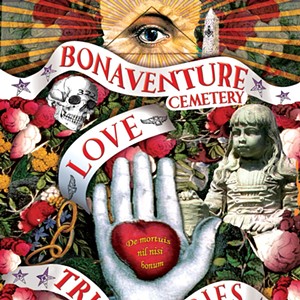Smart People
Even when he's grinning, Dennis Quaid generally bears the sour disposition of someone badly in need of an Alka-Seltzer; that pained grimace serves him well in Smart People, a dark comedy that turns out to be only moderately intelligent.Quaid stars as Lawrence Wetherhold, a miserable English professor whose disdain for his students is matched only by his intolerance of his fellow teachers. A widower who sorely misses his wife (Mark Jude Poirier's foggy screenplay never makes it clear if her death caused his surliness or if he was always something of an SOB), Lawrence lives with his daughter Vanessa (Juno's Ellen Page), a Young Republican who's as unhappy as her dad, and has to contend with an extended (and decidedly unwelcome) visit from his deadbeat brother Chuck (Thomas Haden Church). A minor injury temporarily places Lawrence in the hospital, where his doctor, Janet Hartigan (Sarah Jessica Parker), turns out to be a former student who once had a crush on him. Lawrence and Janet tentatively try their hand at dating while Chuck attempts to get Vanessa to loosen up and enjoy life; both scenarios contain interesting components yet never quite transcend their lukewarm presentations. All four stars are fine -- Quaid and Church are the more memorable of the quartet, but that's largely because the men have the most interesting roles.
Nim's Island
If your kids have been totally weaned on ADD-addled animated flicks that mostly coast on crude humor and instantly dated pop culture references, then this clearly isn't the film for them. If, however, said children still find as much enjoyment (if not more so) in opening a book as in piloting a video game's remote control, then this delightful family film will satisfy them in no small measure. Like last year's Bridge to Terabithia, it views a child's imagination as a tangible playground, and this angle is sharply delineated by the colorful flourishes of directors Jennifer Flackett and Mark Levin. Jodie Foster, the most prominent child actress of the 1970s, here hands the torch to Abigail Breslin, with the latter playing Nim, a precocious girl who lives on a remote island with her scientist father (Gerard Butler). When she's not frolicking with her animal friends, Nim enjoys reading adventure novels featuring the Indiana Jones-like Alex Rover, so when her dad goes missing and strangers invade the island, she naturally e-mails Alex Rover to help her. What her young mind doesn't grasp is that her hero doesn't actually exist; instead, the books are written by Alexandra Rover (Foster), an eccentric agoraphobe who carries on conversations with her fictional creation (also played by Butler) and who reluctantly sets out to help Nim in her hour of need. Nim's Island is occasionally silly (as befits a movie aimed at youngsters), but the sumptuous visuals as well as the presence of Foster insure that discerning adults will also find it worthwhile.
Street Kings
Director Curtis Hanson's instant masterpiece L.A. Confidential was based on the novel by James Ellroy, and here's Ellroy himself writing the screenplay (with Kurt Wimmer and Jamie Moss) for another saga about the boys in blue. It's no wonder, then, that Street Kings' central player, a cop named Tom Ludlow (played by Keanu Reeves), manages to incorporate qualities from all three protagonists in Hanson's 1997 Oscar winner. Kevin Spacey's celebrity cop, Guy Pearce's myopic do-gooder and especially Russell Crowe's brooding tough guy can be found in Ludlow, a veteran detective who's the MVP on an elite squad operating under ambitious Captain Wander (Forest Whitaker). When apprehending (or, more often, blowing away) criminal suspects, Ludlow doesn't always follow the rulebook, which places him under the scrutiny of Internal Affairs Captain Biggs (House's Hugh Laurie). And when Ludlow's former partner (Terry Crews), the man who may have reported him to Biggs, gets fatally gunned down, it's up to the maverick cop to prove that he's innocent of any involvement in the brutal slaying. Street Kings proves to be as standard-issue as much of the gear assigned to real police officers -- is there any doubt as to how deep the departmental corruption runs? -- and this familiarity often numbs the picture's effectiveness. Yet director David Ayer (best known for penning such cop flicks as Training Day and S.W.A.T.) and a gruff Reeves manage to provide the picture with a suitably hard-nosed atmosphere, and even the stunt casting in smaller roles (Cedric the Entertainer, The Game) works.
leatherheads
Football may be a rough-and-tumble sport, but Leatherheads is handled by director and star George Clooney with the delicacy one extends toward an antique vase. Working from a script by acclaimed sports writers Duncan Brantley and Rick Reilly, Clooney offers an occasionally wistful look at the early days of professional football, when its popularity was nil and it was viewed as college football's deformed and ignored stepbrother. The year is 1925, and Dodge Connolly (Clooney) has managed to scrape together a career as a football player, assembling his motley crew to travel all over the country to play games in which attendance is anemic, rules are nonexistent, and a player is as likely to throw a punch as catch the pigskin. Just as it appears the entire league will have to fold, Dodge comes up with a brainstorm. Why not convince Carter "The Bullet" Rutherford (John Krasinski), the nation's most popular college football star, to put his studies on hold and join the pro ranks? Carter agrees just about the time that the Chicago daily has elected to send one of its best reporters, tough-talking Lexie Littleton (Renee Zellweger), to determine the authenticity of Carter's WWI exploits. Gaining access to the team, Lexie uses her feminine wiles to cozy up to Carter, all the while engaging in verbal jousts with Dodge. Clooney is an unabashed lover of classic screwball comedies from Hollywood's Golden Era, and he's gone on record stating that his influences for Leatherheads included such great directors as Howard Hawks and George Cukor. His greatest (unacknowledged) influences, however, stem from more recent times, as it's difficult to watch this film without being reminded of the pair of pictures he made with Joel and Ethan Coen. Perennially growing in stature as an actor and director, it's easy to envision Clooney studying the Coens' M.O. while perched on their sets, since Leatherheads sports the same burnished period look as O Brother, Where Art Thou? and the same screwball comedy stylings as the underrated Intolerable Cruelty. Clooney is on his game as the aging brawler who's disheartened by the rigid direction the sport starts to take, but the likable Krasinski often gets defeated by the restrictions of his colorless part. And as Lexie, Zellweger delivers the script's zingers with aplomb, even if she isn't outwardly quite as brash or brassy as the role requires.
Stop-Loss
Sign of the Times, Part I: While accepting his Oscar in 2003, Michael Moore is loudly booed for criticizing Bush's "fictitious" war in Iraq. Sign of the Times, Part II: During last week's advance screening of the new Iraq War drama Stop-Loss, audience members clap and cheer when Ryan Phillippe's character spits out, "Fuck the president!" As far as cinema is concerned, we're probably still several years away from the definitive Iraq War flick. Stop-Loss at least comes closer than most of the others: Rather than getting buried in ham-fisted armchair liberalism (like Lions for Lambs and Rendition), it carefully tries to include something for everyone on both sides of the war divide. Yet while this approach is a thoughtful one, it can also be a dangerous one, as evidenced by late-inning occurrences that spit in the face of anyone who has ever taken a stand on moral grounds. Helming her first film since 1999's Boys Don't Cry, director Kimberly Peirce (co-scripting with Mark Richard) centers her tale on three Texas boys who all served together in Iraq and have returned to their hometown: Brandon King (Phillippe), a natural born leader and the most intelligent of the three; Steve Shriver (Channing Tatum), a jingoistic grunt prone to repeating canned rhetoric like, "We kill them in Iraq so we don't have to kill them here in Texas!"; and Tommy Burgess (Joseph Gordon-Levitt), the hard-drinking soldier who lost his best friend in the conflict. Having served plenty of time overseas, Brandon expects to settle down stateside, so he's understandably upset when Bush's "stop-loss" policy -- basically, a backdoor draft -- requires him to head back to Iraq yet again. Refusing direct orders, Brandon instead goes AWOL, a decision that irrevocably affects both Steve and Tommy. Despite its serious intentions, Stop-Loss often plays like a softer version of The Deer Hunter, and, without revealing too much, its about-face message ultimately isn't "Fuck the president" as much as it's "Fuck yourself" -- a dispiriting message no matter how it's sliced.
21
Loosely adapted from Ben Mezrich's fact-based bestseller Bringing Down the House, 21 is an entertaining and fast-paced film that occasionally manages to make the act of counting cards seem as exciting as this past winter's Super Bowl -- and as perilous as climbing Mount Everest with both eyes closed.
Jim Sturgess, fresh off his starring role as Jude in Across the Universe (as well as a supporting turn in The Other Boleyn Girl), plays Ben Campbell, a brilliant MIT student who needs some serious dough in order to be able to afford a stint at Harvard. His intelligence catches the eye of Micky Rosa (Kevin Spacey), a shrewd professor whose extracurricular activity is training a hand-picked group of students in the art of counting cards at the blackjack table. He welcomes Ben to a gang that already includes two guys (Aaron Yoo and Jacob Pitts) and two girls (Kate Bosworth and Liza Lapira), and together they set off on weekly excursions to Las Vegas to clean up. Yet although they believe they're operating under the wire, their winning ways -- not to mention squabbles from within -- catch the eye of Cole Williams (Laurence Fishburne), an old-school casino enforcer whose preferred MO is taking cheaters to a back room and beating them to a bloody pulp. The movie works best during its first act, when the fascinating con game is explained to Ben (and to us), and during its second act, when Ben feels his life spiraling out of control as he makes a series of mistakes that could cost him everything. Scripters Peter Steinfeld and Allan Loeb only really lose control during the third act, when an important plot point too lumpy to swallow leads to a series of increasingly unbelievable developments.
Drillbit Taylor
An assembly-line comedy in virtually every facet -- you can set your watch by the moment when the formerly aloof Drillbit (Owen Wilson) is visibly moved by a charitable act on the part of one of the kids -- this dispiriting attempt at corralling laughs has little to offer anyone except die-hard Owen Wilson fans, and even those devotees might feel dejected after watching this charming if one-note actor spinning his wheels in such a tiresome character type.
Run, Fat Boy, Run
Run, Fat Boy, Run stars one of the two male leads (Simon Pegg) from Shaun of the Dead and Hot Fuzz, and, no, it isn't the fat one. Instead, it's the average-sized one, immediately nullifying this movie's title. Now if only someone had nullified this picture's very existence, we'd have one less bomb taking up valuable multiplex space. Instead, we're stuck with a wretched comedy whose greatest claim to, uh, fame is that it marks the directorial debut of Friends co-star David Schwimmer. But with friends like Schwimmer, who needs enemies? Along with writers Michael Ian Black and Pegg, Schwimmer has served up a broad, crass and spectacularly unfunny piece about a sad sack who abandoned his pregnant fiancee at the altar on their wedding day. Five years later, Dennis (Pegg) continues to regret the cowardice he displayed on that day, but the only reason Libby (Thandie Newton) hasn't shut him out of her life completely is because she believes their child Jake (Matthew Fenton) should have a relationship with his father. Dennis hopes to somehow win back Libby, but time is running out since she's becoming more heavily involved with a successful businessman named Whit (Hank Azaria). The lazy and physically unfit Dennis is no match for the industrious and health-conscious Whit, but that doesn't prevent him from entering a 28-mile marathon in an effort to gain back Libby's love and respect. It's a thin premise undermined by rampant stupidity at every turn, from the lazy decision to turn Whit into a paper villain to the infantile brand of comedy that appears at alarming intervals right up to the very end.
The Bank Job
The Bank Job bills itself as being based on a true story, but given cinema's propensity for fudging details, that's not a declaration that I'd be willing to take to the bank myself. But veracity be damned: Even if every detail of this heist flick was drenched in fiction, it doesn't change the fact that it's one compelling package. The film is set in 1971, which seems right, since one could easily picture the British heavyhitters of that era (Michael Caine, Ian Bannen, Harry Andrews, etc.) appearing in a film just like this one (Caine, in fact, did headline a heist flick during this period, 1969's The Italian Job). And inhabiting the film's central role is Jason Statham, current poster boy for British roughhousing. The Bank Job gives his character, Terry Leather, a chance to use his brains more than his brawn, and this allows Statham a bit more vulnerability than usual. Terry is approached by a former acquaintance (Saffron Burrows) to pull off a robbery at a Lloyds Bank that will benefit them both. She has her own reasons beyond monetary gain for making this proposal, and Terry senses that rather quickly. But he and his crew go for it anyway, a decision that involves them in a labyrinthine scandal that not only reaches into the upper echelons of government but also snares the British royal family as well.
Miss Pettigrew Lives for a Day
Romantic without being cynical, witty without being puerile, and blessed by two divine performances from Frances McDormand and Amy Adams. McDormand plays the title character, a British maid in 1939 London who all too suddenly finds herself unemployed. Desperate to remain off the streets, she dupes her way into the position of social secretary to American actress Delysia Lafosse (Adams), a dim but sweet-natured starlet whose biggest problem seems to be choosing between two playboys (Tom Payne and Mark Strong) who can advance her career and a struggling pianist (Lee Pace) who truly loves her. It's a no-brainer ascertaining who gets her hand by the fadeout. Yet despite Adams' screwball-style performance -- as enchanting as her turn in Enchanted -- the film's main source of delight doesn't rest with Delysia's affairs of the heart but with Miss Pettigrew's. A prim woman who lost her beloved during the First World War, Miss Pettigrew has long given up on any chance at romance. That a potential suitor comes along in the form of a successful clothing designer (Ciaran Hinds) seems just right, not only by the demands of the storyline but by the demands of our own hearts.

























